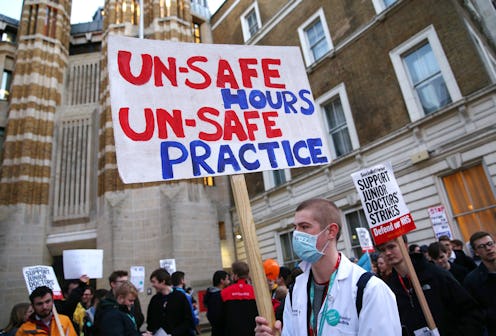News
Dear GOP, This Doesn't Put America's Workers First

If a company had a history of unsafe work conditions or didn't pay their workers overtime, you'd probably want to know that before you hired them, right? Well apparently the U.S. government doesn't. That's what a stake when the Senate votes Monday night on whether to remove Fair Pay and Safe Workplace executive order, enacted under Barack Obama.
On Jan. 31, a coalition of 135 advocacy organizations sent a letter to the Senate, asking that they not undo the regulations set forth in the Fair Pay and Safe Workplaces executive order. These rules, which require contractors bidding on substantial government jobs to disclose if they have violated worker protection laws, are meant to protect the safety and well-being of workers. But if they are undone, as is most likely, it will be a hypocritical move by an administration that campaigned on how he would "put American workers first."
The Fair Pay and Safe Workplaces executive order has three major outcomes, according to Heidi Shierholz, director of policy at the Economic Policy Institute, and the former chief economist at the Department of Labor. It protects workers, it protects tax-payer interests and it levels the playing field for government contractors.
"It's a very clear siding with unscrupulous government contractors over the workers," Shierholz says of the efforts to undo the regulation. For Trump, in particular, she thinks it's a bad move to have this be rolled back under his watch because "at, least optics-wise, has tried to say over and over that he's on their side."
Under the current regulation, companies who wish to bid on government contracts worth more than $500,000 need to disclose any violations of worker safety laws they committed. These contractors would also be required to pay overtime wages, not engage in wage theft, follow fair hiring practices, not allow for discrimination or harassment, and maintain a safe work environment.
"If you're an above-board contractor, its not really fair for you to have to compete for contracts with contractors that have a history of cutting corners," Shierholz says. "Contractors who are cutting corners on safety protections, on paying workers the wages that they are owed, etc., they will be able to undercut contractors who aren't. The economics that follows is that unscrupulous contractors will be more likely to get contracts."
"I would like to hear [Trump] say how this is going to help workers."
"It is a sign of the extremism with which this administration is demonstrating it's going to approach working families," Cynthia McCabe, associate director of communications for the American Federation of State, County and Municipal Employees, tells Bustle. "We firmly believe this is a time to be building up the American family, to be building up the ability of working men and women to provide for their families and to strengthen their ability to do that. This just rolls back progress towards that."
This was not the only executive order that Obama signed dealing with federal contract workers. Melissa Josephs, director of equal opportunity policy at Women Employed, tells Bustle that the 44th president also enacted laws raising the minimum wage for federal contractors and guaranteeing them sick pay. He also made it illegal for contractors to bar employees from discussing their salaries, which is how people often find out they are being underpaid. Josephs fears these could all soon be on the chopping block.
"I'm afraid we may be having this same conversation over the next few months," she said. "I would like to hear [Trump] say how this is going to help workers."
But why rescind regulations that keep workers safe in the first place?
"This isn't what people voted for when they voted for President Trump, and he is failing to meet one of his promises that he purported he was going to stand by on the campaign trail."
Critics of the law called it the "blacklisting" rule and said that contractors who reported violations were blacklisted from government contracts. However, Josephs says that reporting violations does not exclude contractors from getting government jobs. "It actually could've gone further," Josephs says, in terms of the government restrictions." Moreover, a 2013 Senate report found that 30 percent of those who commit the worst violations continue to receive federal contracts.
Labor advocates argue that undoing these Obama-era protections regulations will make workers more susceptible physical harm and easier for employers to take advantage of them. That doesn't seem to gel with Trump's "America First" shtick.
The next step is to make sure that we, on election days, are voting in candidates who stand with working people. That is how we fight back."
"This isn't what people voted for when they voted for President Trump, and he is failing to meet one of his promises that he purported he was going to stand by on the campaign trail," says McCabe. "If you take a look at his cabinet choices, he has stocked it with billionaires, he has stocked it with donors, he has not stocked it with people who seem to scream that they are going to be working on behalf of the American people."
So how do you fight against these actions that harm American people? There's no quick fix, says McCabe, but rather, simply making your anger known at the polls.
"The most immediate and important way...is by voting," says McCabe. "When we see extremists in Congress who are making choices like this and are voting against the desires and values of the American people and the American worker, the next step is to make sure that we, on election days, are voting in candidates who stand with working people. That is how we fight back."